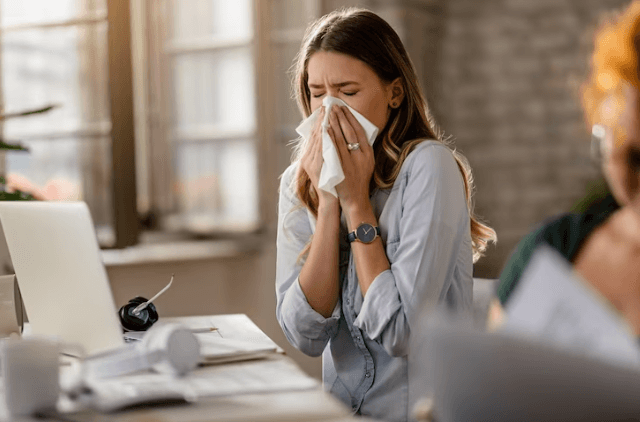Allergies refer to our bodies’ reactions to harmless substances (normally). The symptoms of an allergy range from very mild to life-threatening. The treatments include decongestants, antihistamines, asthma medicines, immunotherapy, and nasal steroids.
Keep reading till the end to find out more information on the same!
About Allergies

Allergies are our bodies’ reactions to any form of foreign protein. These proteins or allergens are harmless.
However, if you happen to have an allergy to any particular type of allergen – then that indicates your body’s immune system is overreacting to the presence of that particular allergen in your body.
The symptoms of allergic reactions include a runny nose, vomiting, watery eyes, and anaphylaxis.
Causes Of Allergies

Allergies are caused by allergens. Some of the more common types of allergens are:
- house dust mites
- Pollen from grass and trees
- the fur of animals – particularly from pets like dogs and cats
- foods like milk, eggs, and peanuts
- medicinal allergies (triggered by certain medicines)
- stings from insects like wasps and bees
- Allergic Reaction
An allergic reaction is the body’s way of reacting to an allergen. If you are known to have allergies, then the first time you encounter a particular allergen, your body is going to respond by creating immunoglobulin E. The immune system makes antibodies for immunoglobulin E.
These antibodies then make space for themselves and live in a person’s respiratory tract, skin, and mucus membrane – all the hollow organs that connect.
The antibodies then locate the allergens in the body and aid in removing them by taking them to the place where they had created a space for living. Here, they attach them to a special receptor.
This in turn causes the allergy cells to release something called Histamine. Histamine is what naturally causes the allergy symptoms.
Prevention Of Allergies

An allergy prevention/management plan is crucial to know. It also becomes essential to control allergies. You can work with your doctor on creating a plan that is most suitable for you.
While you can do all that, here are a few things that you should keep in mind to prevent any form of allergies in the future:
1. Avoid The Allergens
This is very crucial to maintain but is not always as easy to do. There are some allergens that are comparatively easier to avoid than others.
Remember, you might not always be able to avoid it altogether but might as well try to reduce the content of intake and exposure.
2. Take Your Prescribed Medicines
These can be very helpful for managing the symptoms and keeping them at bay. You must make sure that you are taking them at the proper times – as prescribed by your doctor.
3. Keep Track
Build a conscious habit of keeping track of your food habits. Try and also track the symptoms as and when they occur, and what exactly seems to help during those times.
This is going to help you and your doctor find a cure for what worsens or causes the symptoms.
4. Wear A Medical Necklace or Bracelet
If you have ever experienced an allergic reaction then it is advised that you wear a medical alert bracelet. This is going to let others know that you suffer from a serious allergy.
It can also be critical if you have a serious reaction and are unable to communicate.
5. Know What To Do When Experiencing An Allergic Reaction
Always carry a cited (instruction booklet) around with you. This is going to help others and you in figuring out how exactly to tackle an emergency if it arises. You must recognize that you are having an allergic reaction. During times like this, you must respond quickly and correctly.
How To Get Tested For Allergies?

Many different types of allergy tests are available out there. The most common form of allergy tests is blood and skin prick tests.
Blood tests can identify allergies. However, they are also not as sensitive as the skin prick tests. The blood tests evaluate the lgE antibodies that the immune system produces against allergens.
The scratch or skin prick tests can identify the allergens that cause the symptoms of allergy. An allergist is going to use a very thin needle to prick at your skin and then use a wide variety of allergens on them to see the reaction.
After that, they are going to check if the skin reacts to the exposed allergens.
Treatments

Here is a list of some of the common treatments for allergies:
- Try and avoid the allergens(things that trigger your allergy) as much as possible.
- Make sure that you take the prescribed medicines as applicable. They might come in the form of steroid creams, steroid tablets, and antihistamines.
- Immunotherapy or desensitization for the more severe allergic form of reactions. This includes carefully exposing yourself to the thing that you are allergic to over the course of time. This would make your body grow accustomed to it. Hence, as a result, your body would not react to the allergens as badly as it did prior.
- There are also emergency medicines available in the form of auto-injectors such as an Epi-pen which are intended for more allergic reactions.
To Wrap It Up!
If you think that you might be having any allergies then it would only be for the best to get it checked out by a medical professional. That was all for information regarding signs, symptoms, and other related things to allergies.
Thank you for reading up till here. I hope you found the information regarding allergies and related things useful.
Read Also
- Asthma: Signs, Symptoms, Causes, Prevention
- Autoimmune Disorders: Signs, Symptoms, Causes, Prevention


